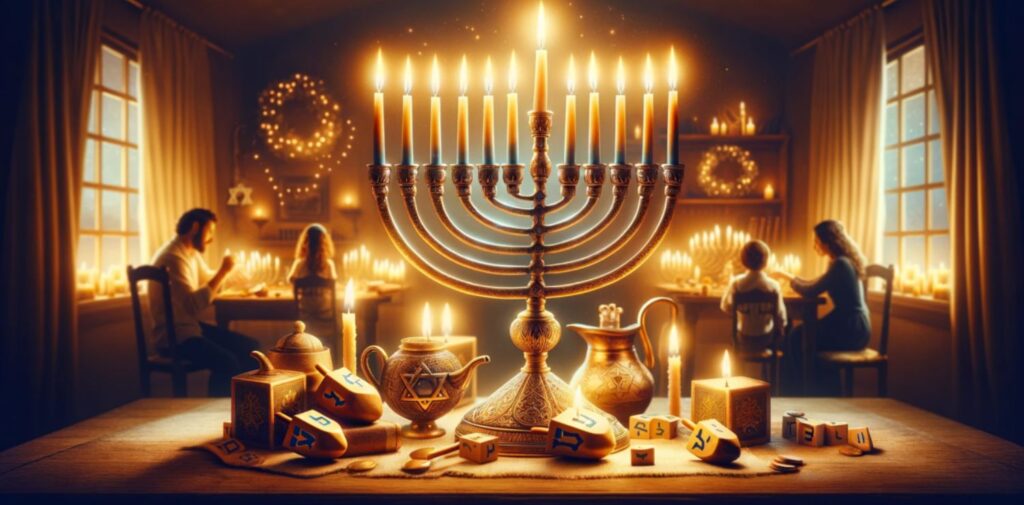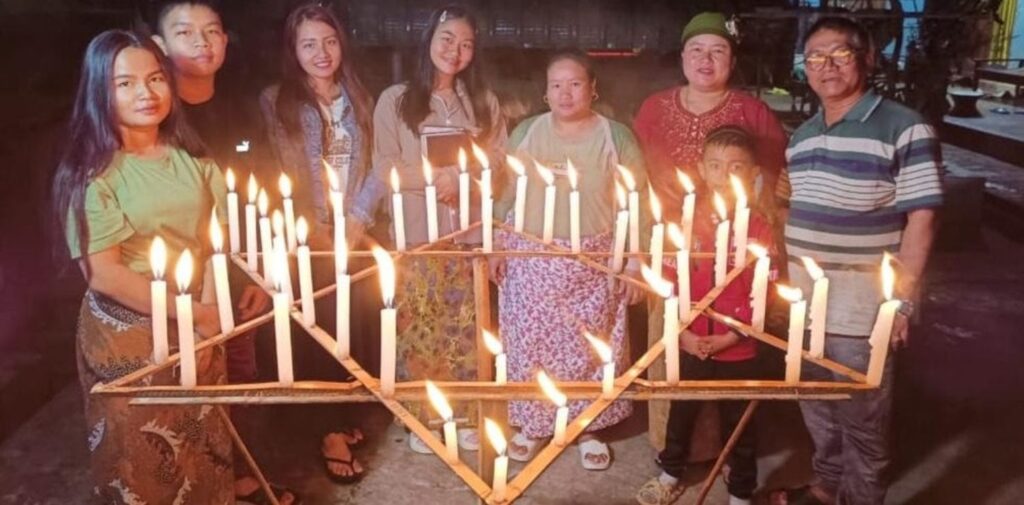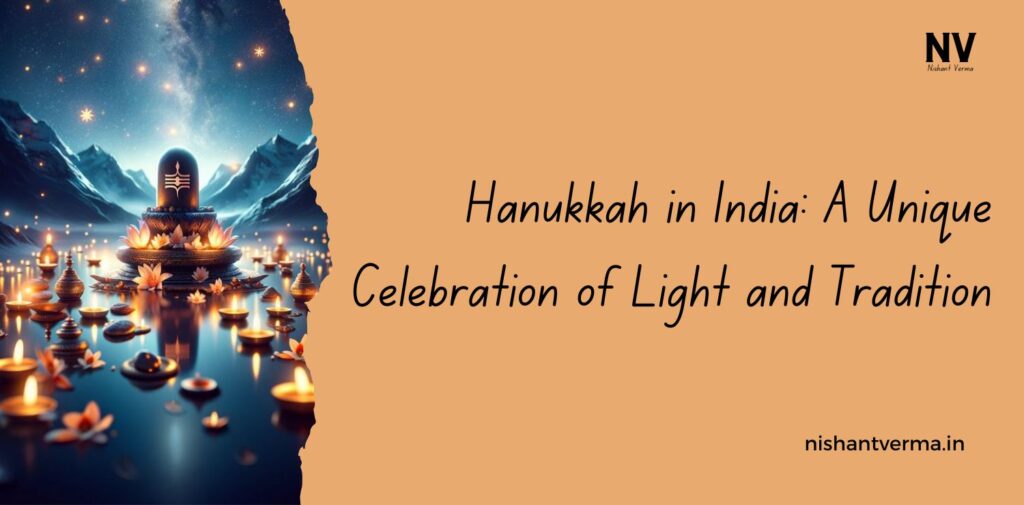Hanukkah, often called the Festival of Lights, is a special holiday for Jewish people worldwide. It is celebrated in honour of the miracle that happened in the ancient Jewish Temple in Jerusalem. The festival is marked by lighting candles, singing songs, and eating special foods like latkes (potato pancakes) and sufganiyot (jelly doughnuts). While Hanukkah is mostly celebrated in countries with large Jewish populations, such as Israel and the United States, the Jewish community in India also observes this important festival in its unique way.
India may not have a large Jewish population, but it has a rich and diverse history of Jewish communities, especially in cities like Mumbai, Cochin, and Pune. These communities have been part of Indian society for centuries, contributing to the cultural and religious fabric of the country. Hanukkah in India is a blend of Jewish traditions and Indian customs, creating a distinctive celebration that reflects the country’s diversity.
The Jewish Communities in India
To understand how Hanukkah is celebrated in India, it’s important to know a little about the Jewish communities that live there. India is home to several Jewish groups, with the three most notable ones being the Bene Israel, the Cochin Jews, and the Baghdadi Jews.
- Bene Israel: The Bene Israel are believed to have arrived in India more than 2,000 years ago. They are the largest Jewish group in India, mainly found in Maharashtra, particularly in Mumbai (formerly Bombay).
- Cochin Jews: The Cochin Jews, or Malabar Jews, have a long history in the southern state of Kerala. They are one of the oldest Jewish communities in the world, with records dating back to ancient times.
- Baghdadi Jews: The Baghdadi Jews are a smaller group, mostly based in cities like Mumbai and Kolkata (formerly Calcutta). They originally came from Iraq and other parts of the Middle East.
While these communities have different backgrounds and histories, they all share the same Jewish faith and customs, including the celebration of Hanukkah.

The Significance of Hanukkah
Hanukkah celebrates the victory of the Jewish people over the Syrian Greeks in the second century BCE. According to Jewish tradition, when the Greeks tried to force Jews to adopt their religion, the Jews rebelled and reclaimed the Holy Temple in Jerusalem. When they went to light the menorah (the seven-branched candelabrum), they found only a small amount of oil, enough to last for one day. However, the oil miraculously burned for eight days, which is why Hanukkah is celebrated for eight days and nights.
The central symbol of Hanukkah is the menorah, which has nine candles: eight to represent the days the oil burned, and one for the shamash, the candle used to light the others. Every night, one more candle is lit, and prayers and blessings are recited.
How Hanukkah is Celebrated in India
While Hanukkah is celebrated in different ways around the world, the Jewish communities in India have their unique way of marking the holiday. Though India is a predominantly Hindu and Muslim country, Jewish families in cities with Jewish populations celebrate Hanukkah with great enthusiasm, often in close-knit communities. The celebrations usually take place in homes, synagogues, and Jewish community centres.
- Lighting the Menorah: Lighting the menorah is one of the most important customs of Hanukkah. In India, Jewish families will place their menorah in a window or near the door to share the light with others. The menorah is lit each night of the eight-day festival, usually after sunset. The youngest child in the family might be asked to light the candles, with the shamash being used to light the others.
- Prayers and Blessings: Special prayers and blessings are recited during Hanukkah. The prayers express gratitude for the miracle of the oil and the strength of the Jewish people. In India, these prayers are often said in Hebrew, but they may also be sung in the local languages like Marathi or Malayalam, depending on the community. Jewish families come together for these prayers, often inviting relatives, friends, and neighbours to join in the celebration.
- Food and Treats: Food plays an important role in Hanukkah celebrations. Traditional Hanukkah foods are fried in oil to remember the miracle of the oil in the Temple. In India, Jewish families make and enjoy foods like latkes (fried potato pancakes) and sufganiyot (jelly-filled doughnuts). These foods are prepared with a local twist, incorporating Indian spices and flavours. For example, some families might add a bit of cumin or coriander to their latkes or use jaggery instead of sugar in their sufganiyot. In Kerala, where the Cochin Jewish community resides, families might also prepare special Jewish versions of local Kerala dishes, like idiyappam (string hoppers) or putty, which are served during the festival.
- Dreidel Game: One fun tradition during Hanukkah is playing the dreidel game. A dreidel is a small spinning top, and each side of the dreidel has a Hebrew letter on it. Players take turns spinning the dreidel and depending on which letter it lands on, they either win or lose a piece of candy or chocolate. The dreidel game is especially popular among children. In India, the dreidel game might be played with Indian sweets or coins instead of traditional chocolates or nuts.
- Community and Family Gatherings: While Hanukkah is a family-oriented celebration, it is also a time for the larger Jewish community to come together. In cities like Mumbai and Cochin, Jewish families gather at local synagogues or community centres to celebrate. These gatherings often include singing songs, dancing, and sharing festive meals. In India, Hanukkah celebrations are known for their warmth, with families inviting friends and neighbours to join in, regardless of their religious background.
- Charity and Giving Back: Like many Jewish holidays, Hanukkah is also a time for charity and helping those in need. In India, Jewish families often make donations to local charities or provide meals to the less fortunate during the festival. This tradition of giving back is an important part of Hanukkah in India, as it is everywhere else.

Hanukkah and Indian Culture
The celebration of Hanukkah in India is unique not only because of the Jewish customs but also because it is interwoven with the rich cultural diversity of the country. India’s Jewish communities have lived side by side with Hindus, Muslims, Christians, and others for centuries, and their celebration of Hanukkah reflects this spirit of coexistence. The Jewish families in India take pride in both their Jewish heritage and their Indian identity, and they celebrate Hanukkah as a way of honouring both.
For example, Jewish children in India may celebrate Hanukkah in the same way as their peers around the world, but they also take part in local cultural activities, such as festivals or school events. Many Jewish families in India also enjoy the holiday by attending concerts or theatre performances, often organized by the Jewish community or other local organizations.
Conclusion: Hanukkah in India
Hanukkah in India is a celebration of light, tradition, and community. Though the Jewish population in India is small, the holiday is marked with joy and excitement, especially in cities with Jewish communities like Mumbai, Cochin, and Pune. Through the lighting of the menorah, the enjoyment of special foods, and the sharing of prayers and traditions, Jewish families in India keep their heritage alive while embracing the multicultural environment of the country. Hanukkah in India is a beautiful example of how Jewish traditions can blend with local customs to create a truly unique and meaningful celebration.




